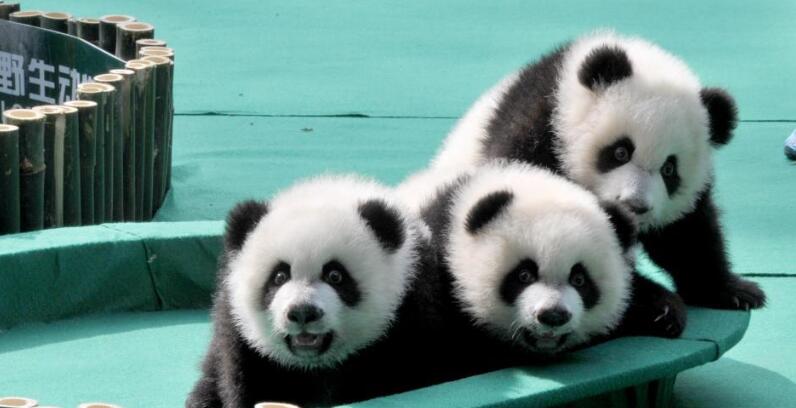In August, San Er, one of Jiao Zi’s triplets, survived thanks to the efforts of giant panda experts and keepers at the Chengdu Research Base of Giant Panda Breeding. At 17 days old, San Er weighed 329g and was in good health. However her mother’s health was threatened because of a long and difficult labor. With the care and attention from die panda base staff she improved, and her birth to triplets gained wide public attention.
Triplets are extremely rare,but experienced mother Jiao Zi accomplished wonders
Hou Rong, researcher and expert of the panda base stated that the survival rate for twins or single cubs for giant pandas was both 50%, and that up to now there have only been two occurrence of triplets being born in captivity. As females age, the likelihood that they will give birth to twins declines. The incidence of an older female giving birth to surviving triplets had never been reported before. Jiao Zi delivered her triplets at age 18, the first case.
In 1967 a female panda from the Shanghai Zoo gave birth to triplets at the age of 9, but none survived. Yong Ba from the China Conservation and Research Center for the Giant Panda gave birth to triplets at the age of 16 on August 18, 1999. Among them, the youngest cub lived for 3 days but died at 3:00am on August 21. Her second cub Yuan Yuan survived for just over a year but died on October 21, 2000. Her oldest cub Guo Qing survived for 10 years but died in 2009.
Jiao Zi is a wonderful mother
Jiao Zi was born on August 21, 1995. She is the offspring of Bing Bing and Lin Nan. Jiao Zi had given birth to 5 litters and 7 cubs up until 2012/ with 6 cubs surviving. When Jiao Zi gave birth for die first time in 2001,she was scared by her cub’s loud squeals and climbed her enclosure bars. She didn’t care for her cub and her mammary glands didn’t produce milk. After years of practice, m 2010, Jiao Zi was folly competent in caring for her cubs, but she had only a little milk. She began to hold her cubs with the help of the foster experts. By 2012, she was better able to hold her cubs. Yet her milk nutrients were low, and she was physically weak due to childbirth. At last, her cub was placed with a surrogate mother.
After more than six months of recovery, 18-year-old Jiao Zi has finally recuperated. She was at an unprecedented weight of 112kg. She went through estrus and exhibited obvious estrus behaviour. Jiao Zi mated naturally on April 25, and on July 29 she started to eat less and then her food consumption rapidly declined. She was visibly thin and had lost weight from 112kg to 85kg.
After 21 days of decreased eating. Jiao Zi’s amniotic fluid broke at 7:45pm on August 18, and immediately afterwards there were only a few uterine contractions. Twenty hours later, the cub’s hind legs and tail could be seen from the entrance of her birth canal at 3:50pm on August 19, but it was colored violet-black. Everts estimated that the fetus was dead. Because the dead fetus could not be squeezed out from the birth canal, Jiao Zi licked and bit at it repeatedly, biting off die fetus’s hind legs and tail in attempts to remove it Jiao Zi struggled, trying to stand up and walk back and forth. The fetus finally flowed from her birth canal. It was an undeveloped fetus. Jiao Zi gave birth to another cub at 4:20pm. To experts’ great relief, the cub cried loudly. Although she’d been through a long hard labor, she held the second cub in her arms with strong maternal wisdom. The experts found that it was also an underdeveloped female cub weighing 96%, with limited abilities to drink milk. Jiao Zi couldn’t keep her cub warm enough and she didn’t have enough milk. .The panda base experts immediately decided to take the cub and provide artificial feeding.
After childbirth, Jiao Zi was too weak to eat anything and she was in danger of dying. Jiao Zi gave birth to another dead fetus at 4:00am on August 21, 57 hours after her amniotic fluid had broken. It weighed 1293g.
Jiao Zi was dying after giving birth but experts rescued her
Luo Li, supervisor of the Animal Disease Prevention and Control Department at the panda base, said that after the extended period of decreased eating and long and arduous delivery, Jiao Zi was in danger. She had a fever, would not eat anything and was in poor mental health. A medical check-up showed experts that her blood vessels had collapsed, her blood was almost as thin as water, and she had a high temperature of 37.8°C. She was preliminarily diagnosed with severe anemia, and veterinarians immediately gave an IV treatment. Jiao Zi had a poor appetite, and ate only a small amount of liquid food the next day. Veterinarians soon adjusted the treatment plan, using every means possible to feed her and give her a prepared iron vitamin. They chose various bamboo stalks and bamboo shoots for her. Jiao Zi began to eat bamboo shoots 5 days later. Gradually her mental health and appetite returned, and she had regular bowel movements, an indicator that she had recovered physically.
Experts not only obtained first-hand information about the birth of triplets, but also gained more experience on captive panda breeding and treatment of threatening conditions.






















































































